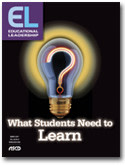I must study politics and war that my sons may have liberty to study mathematics and philosophy. My sons ought to study mathematics and philosophy, geography, natural history, naval architecture, navigation, commerce, and agriculture in order to give their children a right to study paintings, poetry, music, architecture, statuary, tapestry, and porcelain.
More than 200 years later, as we ponder what our children should learn, I wonder what insights John Adams would offer. Would he believe the next generation should concentrate on science, technology, engineering, and math in order to maintain global competitiveness? Would he lament the fact that the arts and, to some extent, politics and war (also known as social studies) have less time in the curriculum than they used to have? Might Adams also add a few unanticipated topics to the list—for example, genetics, media literacy, environmental studies?
This issue of Educational Leadership wrestles with the question "What do students need to learn?" in the context of the Common Core State Standards. The hopes for the standards are many. Advocates believe that by adopting one set of standards rather than a patchwork of 50, we will eliminate the disparities among states and ensure that students who transfer from one school to another will encounter a more coherent curriculum and be better able to build on what they have learned. And by internationally benchmarking the standards, we will raise expectations for all students.
The standards are only the first step, however. To come will be debates about which curriculums best align with the standards, which assessments will best measure the level of performance expected, and how best to effectively teach to both the standards and the assessments. Our authors take up a few of the debates, and not surprisingly reach different conclusions. Here are some of them:
Focus on content. Lynne Munson's organization Common Core (not to be confused with the Common Core State Standards) looked at curriculums, standards, and assessments in nine nations to see whether differences in countries' PISA scores are due to differences in the content they teach (p. 10). Findings revealed that top-performing nations share a dedication to providing their students with a comprehensive education across the liberal arts and sciences, whereas U.S. students spend countless hours preparing to take tests of their basic reading and math skills. Munson concludes that the lesson is to focus on content knowledge and give less emphasis to skills alone.
Focus on key cognitive skills. The Common Core State Standards offer an opportunity to shift education away from shallow, test-prep instruction, writes David T. Conley (p. 16). Two consortia of states are now developing common assessments designed to measure deeper, more complex learning than current state tests do. Conley describes the cognitive skills that students need for college and career success (problem formulation, research, interpretation, communication, and precision and accuracy). Educators need to keep these skills in mind as they develop curriculum and instruction to teach to the standards.
Revive the humanities. Schools have traditionally had the goal of helping students grow in three areas: personal, economic, and civic. In recent years, however, the economic realm has taken precedence, with careers and credentials becoming a focus of education policy. David J. Ferrero (p. 22) bewails the lack of support for the more personal and civic aims of education and suggests that a strong education in the humanities can bring these forgotten values to the forefront without depriving students of the economic benefits of education.
Modernize the high school experience. High school is boring, writes Grant Wiggins (p. 28), in part because lock-step diploma requirements crowd out personalized and engaged learning. It is also boring because current content standards are based on traditional, subject-area notions of curriculum instead of on the essential question, What do students need to be well prepared for their adult lives? Today's standards, he writes, are developed by committees who "merely rearrange the furniture of the traditional core content areas; they replicate the past that they feel comfortable with." Wiggins advocates engaging in a national conversation about the mission of schooling to develop standards that are "forward-looking, client-centered, and flexible."
Teach all kids to read. Richard Allington (p. 40) reminds us that two of every three students in U.S. schools read below the level needed to adequately do grade-level work. Why aren't schools offering high-quality professional development in the teaching of reading and expert tutorial instruction for at-risk kindergartners? he asks. If we did so, we would vastly reduce the pool of struggling readers and better prepare students for whatever standards, curriculums, or assessments they encounter in the future.
Although we cannot know for sure what John Adams would think of these conclusions, we can see that he understood that his children's children's "common core" might well be different from his own. We can also sense his abiding faith in the power of education to change the world.


